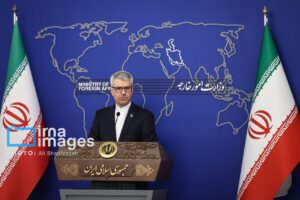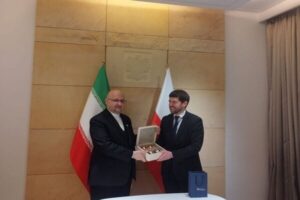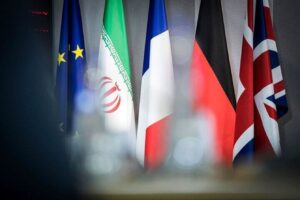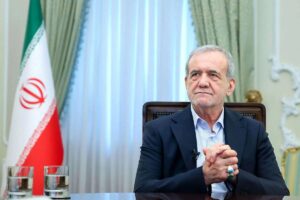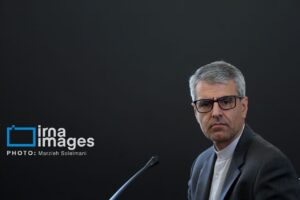Zarif, in an interview with Daryl Kimball, Executive Director of the Arms Control Association (ACA), responded to several questions. The following is the full text of the conversation.
Daryl Kimball: Thank you, Dr. Zarif. You have covered a lot of ground, a lot of recent history, and thank you for giving us your perspective on our common history on these issues for the last several years.
But how can we break the cycle of escalation? As we sit here today, diplomats are in New York—your current foreign minister, Mr. Araghchi, and others—are busily seeking answers to the current conundrum that we find ourselves in ahead of this deadline that could lead to the snapback of the UN sanctions. I want to ask a couple of questions about how we can move forward.
I start, I think with what is an obvious question, which is given the circumstances, given the constraint, given what has happened up until now, what particular formula could the two sides agree upon in the next 24-36 hours? They have to address the concerns that E3 have, the needs that Iran has, and what the IAEA is looking for, so as to provide more time ahead of the possible deeper crisis and to push off the snapback of the sanctions. What you see, given what you know, what your foreign minister has been saying, what the E3 is saying, what is the formula that might move things forward in this 12th hour?
Dr. Zarif: It is important for everybody to see what the possibilities day after snapback would be. I believe it will not add to anybody’s leverage. It will only make it more difficult to reach a solution. There were conditions by the EU. Minister Araghchi believes that he has met those conditions, by signing an agreement with the director general of IAEA, Mr. Grossi, and offering to continue negotiations which the United States broke actually—which it really broke by bombing the negotiating table. So, I don’t know what Europe is looking for. The consequence of what Europe is doing will be only to disqualify itself as a partner in the negotiations.
I think it is easily possible to move forward based on the suggestion by Iran, probably modified in the course of negotiations, provided that Europe leaves this ivory tower of self-righteousness to accept that it has been at fault. You know, when I was foreign minister, we negotiated with Europe an almost 19th-century barter arrangement, and Europe was not capable of even implementing that. So Europe should not consider itself as the only group or only three countries that have observed JCPOA. They destroyed JCPOA by destroying their own commitments after Trump withdrew from JCPOA. They made twice 11 commitments to us. And they did not implement a single one of them. They should answer to that, and instead of taking the high ground come and look at the future and see what they would gain by doing this. Legally they do not have any justification for snapback. Politically they can do it. They can put pressure on members of the Security Council as they did. But legally and morally they have no justification for bringing back Security Council resolutions.
So, I believe possibilities such as consortium, possibilities such as renewed cooperation between Iran and the IAEA, possibilities for negotiations between Iran and E3 plus Russia and China—maybe later joined by the United States. These are all possibilities on the table that could be addressed. Again, I am not speaking as the government’s representative. I do not know the state of negotiations. You will be listening to them tomorrow, and you will hear from them what the plan is, but I am just following it from TV news, and this is my impression.
DK: So, given the difficulties, I think that it is an unlikely possibility that there will be an agreement in the next 24-36 hours. It looks like snapback will happen. So, I want to ask you a couple of questions in this regard. Looking at discussion in Tehran, there are two possible ways in which the government being pushed by some in the Majlis to retaliate. One is by initiating steps to withdraw from the NPT. You mentioned that supreme Leader ruled out that a couple days ago but still there is pressure to do that. And the second, ending or slowing of cooperation with the IAEA. Let me just before asking you to address those two questions, understand how initiating withdrawal from NPT is going to assure the world that the program is peaceful. To understand how ending cooperation with the IAEA is in Iran’s interest. Because it is in Iran’s interest to show that what the program is doing that Iran is not crossing weapon’s threshold. So in your perspective as an observer, as insider in Iran, how will this play out in the next few days? And what is your personal opinion about whether either of those two approaches is wise and why would it not be wise?
JZ: Well, the argument of those who underscore the need for further cooperation is extremely weak now. Because after Trump withdrew from the JCPOA, Iran fully cooperated with the IAEA for a full year and implemented the JCPOA for a full year. If you look at the report of the IAEA in June 2019, you see that Iran continues to implement its obligation while Europe did not do anything and United States obviously withdrew. So arguing for remaining committed to these international instruments in a one-sided manner does not hold a lot of persuasion in Iran in the public opinion and in the Parliament, which has never been very friendly to the JCPOA or to these agreements, because of the record. Actually, I do not want to blame them. It is actually the very bad record of failure after failure of the US and Europe in abiding by their own commitments—in simply fulfilling their promises. So, now withdrawing or giving notice to withdraw from the NPT does not mean building a bomb. It means that Iran does not want to engage in a one-sided agreement. I do not endorse it, but you can understand it. And it provides 90 days of negotiation time. So, I believe in either case—whether Iran reduces cooperation with the IAEA or sends the notification for withdrawal—we still have time to engage in negotiations.
Many in the United States say snapback is not the end of the world. By the same token and based on the same argument, sending notification to withdraw from the NPT will not be the end of the world. I think they are far less justified in sending the notification and actually rescinding Security Council resolution 2231 than Iran is to send the notification to withdraw from the NPT based on article 10. You know Iranian facilities have been bombarded, Iran’s agreement in good faith have been neglected and violated by the other side. So legally speaking, Iran can in fact, whether I like it or not, Iran can in fact argue that it has right under article 10 of NPT to send that notification. If it did, we still have three months to negotiate.
DK: Alright, I would just reply briefly by saying, just because things can be done does not mean they should be done. And in some quarters, especially in South Asia, some people call the Arms Control Association, in particular, a non-proliferation Ayatollah. So, I note that in no universe do I see value in moving away from NPT, and it would definitely reinforce the concerns that you spoke of so eloquently with the US about Iran’s mal intentions with respect to the bomb. You know that but I feel obliged to make that comment.
JZ: I am sure you will agree with me that withdrawing from the JCPOA and moving to snapback would be the same with the same argument that you just made.
DK: …. You were talking about some of the reasons why Iran might back out of its commitments to cooperate with the agency those commitments are part of its NPT obligations. Of course and you spoke about regional architecture here and a bit more in the piece in the Guardian. And I would just note that it seems to me to be much more difficult to pursue something like that which is something as you written could be pursued by the states in the region under their own direction and does not require Europeans, Americans, anybody’s permission. But it would be difficult to understand the base line for Iran’s nuclear program without strong IAEA role in each of the countries in the region including Iran. If you could, Dr. Zarif just outline very quickly how a regional consortium concept would work. How might this be a good long-term solution—an alternative to what we have tried, and it is not the path forward, the JCPOA?
JZ: I basically wrote that to provide alternatives for the very dangerous path that the Europeans and Americans have taken. Unfortunately, no one listens. I think that can be done, and it is two things at the same time. A strict non-proliferation regime that would include very strict mutual monitoring, reciprocal monitoring of countries in the region by their own representatives, by a group of representatives, experts from these countries in the region, to monitor every country of their obligation. This is happening between as you know, between Argentina and Brazil; they have a mutual monitoring mechanism. This can happen in the region between all these countries. At the same time, it can include cooperation. Now, various countries in the region have various nuclear programs. Iran has the enrichment capability, the knowledge, the technology for enrichment. Others may have other abilities and expertise, and we can exchange them based on the level of the expertise, financial possibilities, and other arrangements to have a consortium not just for enrichment and for fuel but in fact even for fusion. I believe fusion is the future of nuclear energy and we can in fact cooperate with Saudi Arabia and with others in the field of fusion. I was given when I was vice president proposals by many including some American companies that we can engage in a three-way cooperation with Saudi Arabia and the United States to engage in research and in fact implementation on fusion. As you know Iran’s scientific bas is extremely capable not just in the area of enrichment but in various area, from artificial intelligence, as Elon Musk has already confessed that the best engineers and programmers are Iranians. So, we have a pool of know-how in Iran, a pool of technological capability and other countries have financial capabilities, and others have scientific possibilities and we can put that all together—build confidence, engage in monitoring and at the same time insist on non-proliferation and the establishment of a zone free from weapons of mass destruction in the Middle East.
DK: Thank you for outlining that. I would like to just as a piece of advice as a non-governmental representative, remind you that one op-ed in one newspaper is not going to convince everyone. So, persistence is key, and I hope that we continue this dialogue. We were honored to have you speak to us. I hope that at some point in the future we can connect by video and communicate back to some of your audiences you are going to establish with your new institution which we wish you luck with.
JZ: Thank you and as I mentioned in my introductory remarks, I ask you to join me in presenting alternative forward-looking possibilities in op-eds, in research papers. I also look forward to welcoming you either by video link or in person in Tehran. You are not designated here, but I am designated in the U.S., so I cannot travel to the United States, but you’re always welcome to travel to Iran.
DK: I have to check with my wife whether I am designated or not.

